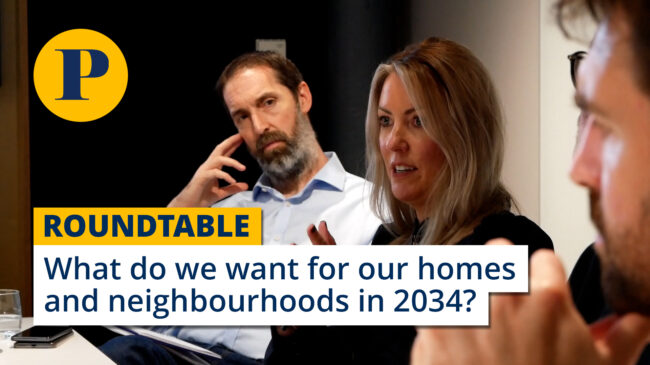The Subplot
The Subplot | Truss donation, 3D printing hopes, investment zone latest
THIS WEEK
- In Liz we Truss: why a £15,000 campaign donation doesn’t yet feel like a bad move for a Manchester affordable housing developer
- Elevator pitch: your weekly rundown of the risers and fallers making the news

IN LIZ WE TRUSS
Big Truss donor has big hopes for affordable housing
Will the Truss government’s affordable housing rules screw up plans for a local social housing business, and £15,000 campaign donor? It says not.
And this answer turns out to be about one of the most central issues of the day – affordable housing – and reveals the often-ignored nuances behind today’s big-picture headlines.
Who are we talking about?
So, the background. In July this year, a company called Grolar Developments made a £15,000 cash donation to Liz Truss’s Conservative leadership campaign. Grolar is controlled by Hornsearle Property Group, which is in turn controlled by Guy Horne and David Searle. Trading as Manchester-based HS Property Group, the duo have a growing reputation as a social and affordable housing provider – as recently as June, Place North West reported on the company’s £70m investment in nearly 600 supported housing units.
Big problem, big opportunity
Affordable housing has plenty of problems already (Subplot, 24 February 2022) but if they can be cracked, then providing a plentiful supply is also a huge business opportunity. Something like £1.2bn of private investment is waiting to move into the sector in the North West, based on industry reaction to a March report by L&G and the British Property Federation. One of those poised to grow is HS Property Group.
How it works
HSPG’s business is to provide houses that local councils can rent long-term to provide supported and affordable housing at a rent covered by the local housing allowance. The houses are operated through Park Properties, HSPG’s social housing provider, and acquired from developers that meet their affordable housing obligations, or via section 106 contributions. Today it adds up to a few hundred houses but in the next 12-24 months this will balloon to 800 or more, says Horne. What holds him back, he adds, is the supply of houses he can buy – a particular problem in the North West. “Is [the lack of supply] about enough homes being built, or local authority costs, or section 106 money? I don’t know,” he says. Horne has written about the size of the affordable housing gap in the North and the urgent need for more homes to be built.
But the government thinks…
Now fast forward three months (and an eternity of political action later), and the Truss government is mulling plans to lift the affordable housing obligation threshold raising it from schemes of 10 houses or more, to schemes of 40 or 50 or more houses, a move likely to reduce the supply of affordable housing by about one-fifth. This would be done at a time when rapidly rising mortgage rates make affordability the hottest possible political issue. Given that HSPG’s core activities depend on acquiring a steady flow of affordable housing coming from the obligation, section 106 funding and the Community Infrastructure Levy, this looks like bad news, doesn’t it? Surely it’s a poor return on the parent company’s Truss investment?
More of the same
It gets worse, because a cap on affordable rents – announced on 31 August, with potential limits of 3%, 5% or 7% – makes the fragile maths of affordable housing development even worse. “The rental cap means a larger disconnect between market rents and affordable rents, which means people like us bid lower, which passes the cost back on to housebuilders. It is getting more and more tricky, and is getting rid of the smaller players. It is harder for new entrants,” says Horne.
So, is he happy?
Having got this far, you might think that Horne would be regretting his part in a £15,000 Truss donation. But not at all. “I can’t speak on public policy, I’ve no influence there,” Horne says. On the affordable housing obligation, Horne sounds somewhere between mildly hopeful and agnostic. “There are two schools of thought, and I’ve not looked at all the numbers so I can’t say which is better, but the government’s idea must be hoping it means more houses get built, and does that mean more people move up the property ladder, potentially freeing more homes at the bottom?” Whether it does or not, Horne and his team are exploring other options, such as Homes England grants. Because these grants are based on a standard rent (the local housing allowance) they can stretch more easily to cover development in relatively low house price areas. “We’re asking how we can be more creative, and if there’s less section 106 [money] or affordable development, how we can use grants,” says Horne.
Judgment suspended
Horne’s conclusion will be music, of a kind, to the Truss administration’s ears. Asked if he felt he’s getting what he hoped for from the donation, Horne says: “It is early days yet – we wanted to have a government that is socially conscious, and felt that Truss was more socially conscious. But it is difficult to judge after a few weeks, although I’m still hopeful that will be the case. I’m still confident in the longer term outlook, although the issue is navigating the right way now.” And then he adds: “If the government increases the local housing allowance – which closes the disconnect between market and social rents – if that happens, my answer is ‘yes’ to the last question.”
IRL
With the financial markets still in turmoil, government borrowing still super expensive, and some vast spending cuts looming, the chances of a substantial increase in the local housing allowance seem small. On the other hand, political reality may mean the government has to do something – and a gesture on affordable housing might be wise. Nobody makes donations expecting a direct or even indirect policy payback – that’s not how politics or business works. But whatever happens, the issues facing the developer behind this Truss donation reveals the knotty policy issues that will determine real world outcomes – the outcomes most voters will be watching for.
 ELEVATOR PITCH
ELEVATOR PITCH
Going up, or going down? This week’s movers
If you’re sitting on a thin, fairly useless investment zone proposal, do not despair, your chances just went up. But can 3D printing manage what modular housing couldn’t? Going down!
 No-hoper investment zone bids
No-hoper investment zone bids
A tiny bit more emerges about “investment zones” ahead of tomorrow’s deadline for the submission of bids. A revised FAQ document from the government suggests this is the one and only chance to bid: no further rounds are trailed. The document (still) says how high the bar will be for success (the Treasury wants to keep a lid on the number of zones). But after strongly rumoured fisticuffs with 10 Downing Street, whose incumbent wants to see many more zones scattered about, the document now raises the hope that several phases of zone announcements will be made, all arising from tomorrow’s crop of bids.
“In the event of a very large number of expressions of interest being above the quality line, we will phase the investment zones taken through to detailed delivery planning – starting with bids that are most ready to deliver and have demonstrated they are likely to have the greatest economic impact,” the document says. So by phase three or four we can be pretty sure these zones will be what…largely pointless? Super expensive per job created? It’s hard to know. This Downing Street versus Treasury battle has a long way to go yet.
 3D-printed houses
3D-printed houses
A big hello to the arrival of 3D-printed houses in Accrington, where not-for-profit developer Building for Humanity says it could, potentially, knock out 46 homes in weeks. It’s all very exciting, but maybe don’t get too worked up. Remember how amazing modular housing was going to be? Remember how it would solve housing issues and produce lovely trouble-free homes with far less snagging than traditional builds? It’s not turned out like that for all kinds of reasons.
Meanwhile developers – and occupiers – worry that the long-term life of modular is limited because such properties are standardised and not designed for extensions, or moving bathrooms, or the kind of home improvements most homeowners rather like to do. Can 3D printing do any better?
Get in touch with David Thame: david.thame@placenorthwest.co.uk
The Subplot is brought to you in association with Oppidan Life.






“Nobody makes donations expecting a direct or even indirect policy payback – that’s not how politics or business works.”
You must be very naive. Why else do these people make donations.
By AngryfromManchester